Formula 1's half-term report: 'Don't overthink it, Nico'
- Published
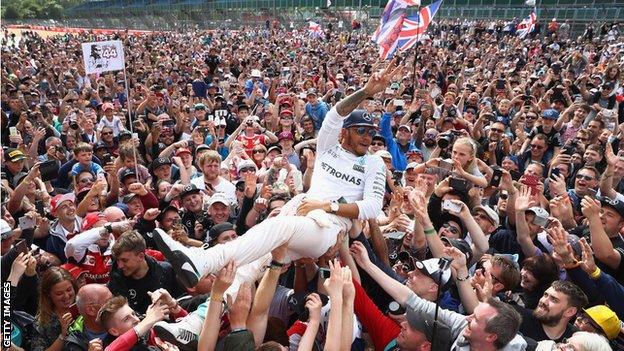
Formula 1 has reached its mid-season summer break, so this is a good time to look back on the year so far and assess the teams, drivers and sport itself.
It has been a pretty good season so far, with a close title fight and all but three of the races really entertaining, with fights up and down the field.
One thing is very clear after 12 races - Mercedes are in total control again. Inconsistent challenges from the other teams mean either Lewis Hamilton or Nico Rosberg will be world champion come Abu Dhabi in November.
The battle between the two Mercedes drivers is much more interesting than last year, when Hamilton ran away with it, and there have been some major moves - up and down - behind them to keep up the depth of interest.
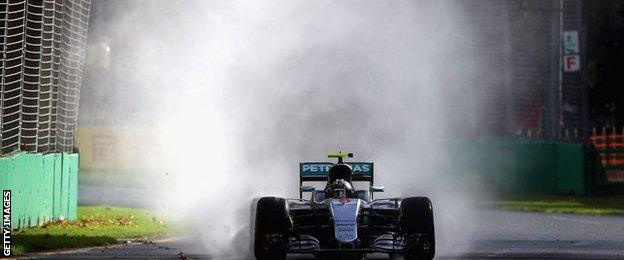
Rosberg steamed ahead at the start of the season, winning here in Australia, before further successes at the next three races - in Bahrain, China and Russia
Mercedes
Only Mercedes can really stop Mercedes winning this year - that much has become obvious.
The car still has a huge pace advantage and the only technical weakness they seem to have is their start procedure - we have seen a Mercedes driver lose places at the start quite often this season.
It's a tricky one to get on top of because it does not show up in simulations, and it is not a normal part of car-performance development. But it is one they will want to sort out because it's no good qualifying at the front if you lose places at the start all the time. It can also lead to first-corner accidents, such as Hamilton's in Bahrain.
On the driver front, the reverse in Rosberg's form has been quite remarkable.
Forty-three points ahead after four races, he seemed to have a headlock on the season, and I remember writing in a column back then that it would be tough for Hamilton to come back because Rosberg seemed much more in control and comfortable with himself.
Instead, there has been a 62-point swing in the last seven races and now Hamilton is leading by nearly a clear win.
In hindsight, the turning point was the two races in Spain and Monaco.
In Spain, the two Mercedes drivers crashed out together on the first lap - and both of them got a serious talking-to from team boss Toto Wolff.
At the next race in Monaco, Rosberg qualified well, but had a shocking race in the rain.
He was so slow in the opening laps that Mercedes ordered him to let Hamilton by, and he finished seventh as Hamilton won.
Since then, Rosberg has never been ahead of Hamilton in the races, other than in Baku, when Hamilton took himself out of the reckoning by driving badly in qualifying.
Being asked by your team to let your team-mate by - I've experienced that, and it's tough to handle, I can tell you. As is knowing you were more than second slower than your team-mate in damp conditions.
For me, Spain was key. I don't think Rosberg would have been so quick to let Hamilton by in Monaco if that crash had not happened - because he would not have been under that threat.
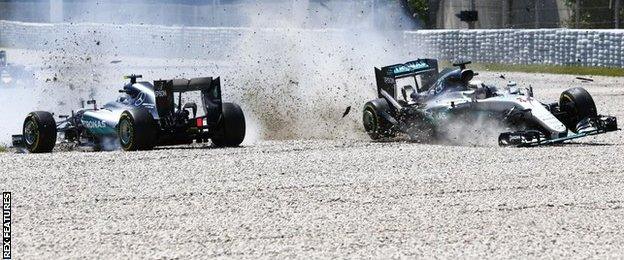
Rosberg and Hamilton's rivalry intensified after the pair crashed into each other on the first lap of the Spanish Grand Prix in Barcelona
Rosberg is going into the summer break after another poor race in Germany. He will be in two minds - part of him will be wishing there was another race this weekend, to give him another chance to make amends, and part of him will be glad there is not, so he can take a breath.
He has said he is going to go away and analyse what's happened. I think he'd be far better to forget about it, have a really good holiday and try to come back fresh in his mind.
The last part of the season is tough - there are a lot of races in a short space of time, and most of them are a long way away, with each of the seven "fly-away" races lasting six days. So that is 42 days over many time zones.
It takes it out of you, and you have to come back pumped and ready to go.
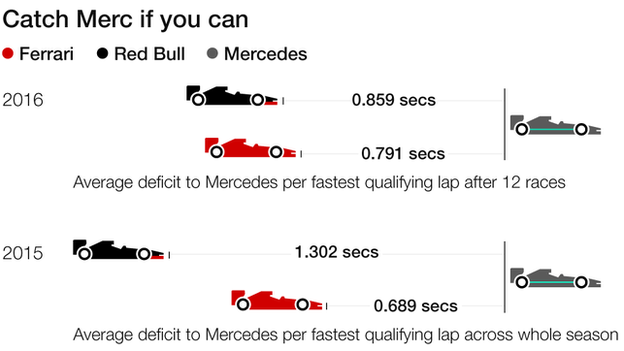
The closest chasers
Red Bull have made a massive improvement in performance from last year to this. Last year, they were 1.5secs a lap on average slower than Mercedes in the first half of the season - and 1.3secs for the whole season. This year, they are 0.86secs slower so far.
A lot of that gain is from Renault's improved engine, but some is the Red Bull chassis, too, and they have now overtaken Ferrari, having scored 33 more points than the Italian team since Max Verstappen was promoted in Spain.
In hindsight, that move to swap Verstappen and Daniil Kvyat seems perfectly judged.
Expect Red Bull to go well in Singapore and Japan particularly, but also on some of the other circuits in the latter part of the season. They are the only team other than Mercedes with a chance of winning any races.
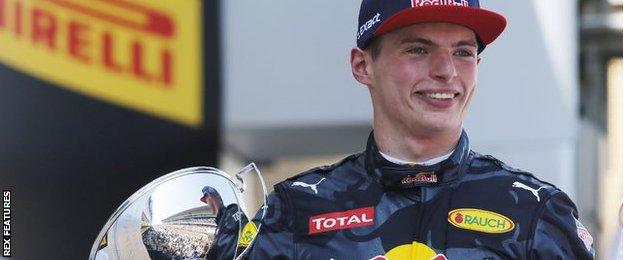
We are not the only ones who wants the Rosberg-Hamilton rivalry to hot up. Verstappen won his first race, at just 18, after the Mercedes pair crashed in Spain
Ferrari started the season in that position but have slipped back.
Their gap to pole is more or less the same as it was last year - at just under 0.8secs. But the average grid position for the best Ferrari is fourth, when it was third last year. So now there is at least one Red Bull between them and the Mercedes, and they are therefore less able to benefit from any weakness in Mercedes' starts.
Fundamentally, Ferrari's problem is that the car is not quick enough. They say it is lacking downforce, which is true, but the team is in a mess, too.
Whatever the circumstances around the departure of technical director James Allison, it is a big headache for Ferrari. They don't have anyone to take his place, and so you are looking at 2018 before anyone new can have an influence.
When Ferrari were winning championships in the last decade, they had a consistent design team and structure. It's no coincidence that now they do not have that, they are not winning any longer.
Ferrari need stability, when it appears they have a revolving door. That can't make it easier for them to recruit quality people.
Add in some pretty consistently haphazard strategy calls and it's clear why they are struggling.
McLaren on the way back
McLaren-Honda have made huge progress - not just from 2015 to 2016, but through this season as well.
Aerodynamically, the car looks quite good, and Honda are making progress with the engine, even if there is a long way to go.
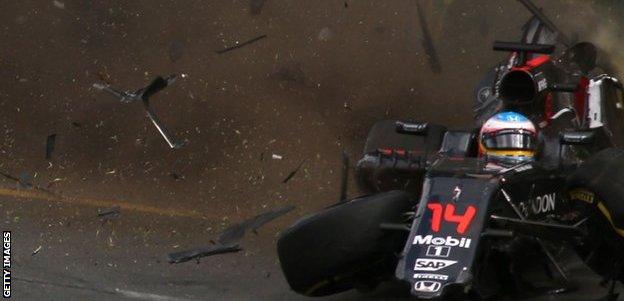
Fernando Alonso will not forget the 2016 season in a hurry, if only for one of the biggest crashes in recent years at the Australian GP
They are still a chunk off - at just under two seconds off pole on average for the season so far - but they are now consistently knocking on the door of the top 10 in qualifying, and quite often with both drivers.
Jenson Button always pulls out a solid result. Fernando Alonso has been more impressive generally over the season, but has had a few shaky races, too - such as when he screwed his tyres closing on Button trying to make a point about strategy in Germany.
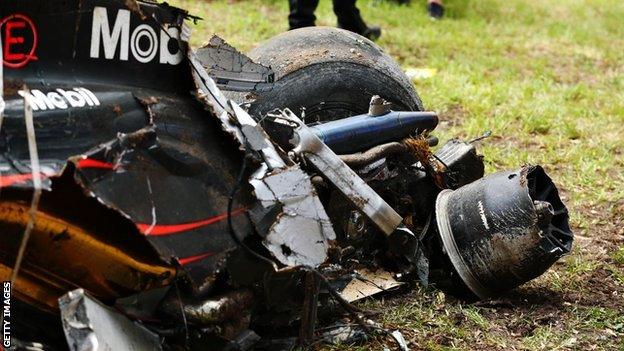
The Spaniard missed the following race in Bahrain with rib injuries - you would take a few rib fractures from a wreckage like that
And we hear a lot more from Alonso with his occasionally pointed comments over the radio, which make us laugh more than they will the people on the pit wall.
They are on a charge - just in time for their new chief executive Jost Capito to join next month from Volkswagen.
Kvyat in pieces
Since Daniil Kvyat was demoted to Toro Rosso from Red Bull, he has scored one point on two occasions, for two 10th places. Team-mate Carlos Sainz has scored 26 points.
Things look bleak for Kvyat. Let's not forget he was on the podium in China in April; now his career is hanging in the balance.
It's not that he can't drive; we know he can drive. I think he has simply lost confidence - which is hardly surprising after being dropped from the senior team to the junior team.
He needs to do what he has said he will do - trust his instincts and not overthink it. He needs to get back to driving instinctively. That is the only way to get things back on track.
Even then, it is going to be a tough second part of the season, because Sainz is quick and smart.
Toro Rosso also need to improve their pit stops - they consistently lose positions and time, such as Sainz's potential podium in Monaco. Whether it is technical or human, I don't know, but it needs sorting out if they are to make the best of what is a pretty decent car.
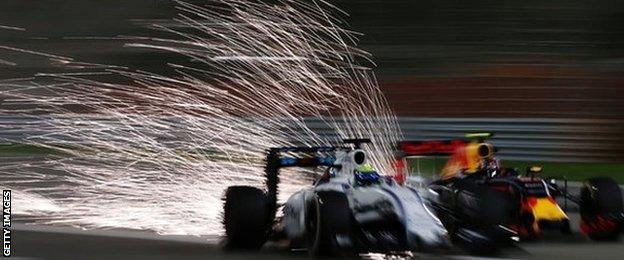
Are sparks good? Sparks can't be good... The season has so far provided some spectacular wheel-to-wheel action
Williams worries
Williams were third in the constructors' championship for the last two years. This year, they won't repeat that and are under pressure for fourth from Force India, who are consistently impressive in doing a neat, tidy job with a small budget.
The days of Williams leading races, such as in Austria in 2014 or Silverstone last year, seem long gone. And their problems on slow, low-grip tracks remain - which I suspect is a basic lack of downforce on the car.
They are 0.2secs slower relative to Mercedes than they were last year and they are not even pulling out results on tracks that should be good for them, such as Hockenheim.
Williams don't have the development budget of the teams ahead of them, and this is a more realistic position for them as a team.
At the same time, they have switched focus to the big rules changes for 2017 very early to try to get a jump on the others under the new regulations.
The running of the sport
The management of F1, between the teams, Bernie Ecclestone and governing body the FIA, has left a lot to be desired this year, and it's a bit frustrating that things can't be sorted out properly behind closed doors before they become public.
It's easy to forget, but the season started with the debacle over knock-out qualifying. It was sort of forced on the teams, and not liked by either them or the public.
The idea was to spice up the racing, but it detracted from something people were paying good money to see.
There was another example in the last week or so with the halo. All year, it has seemed as if F1 was moving towards introducing it next year, and then suddenly it was postponed for a year for a not very convincing reason.
And then there was the U-turn in the team radio rules before Germany as well.
It seems as if one group is saying something is happening and then others are deciding - sooner or later - that it's not. It's just not joined up, which is not a great image to present for such a high-level professional sport.
It really needs to be sorted out over the rest of the season and heading into 2017.
Allan McNish was talking to BBC Sport's Andrew Benson
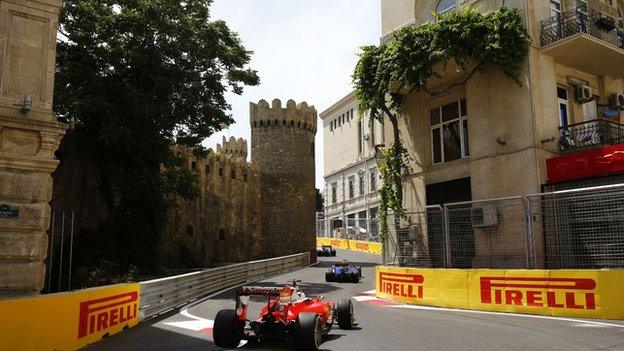
The picturesque setting of Baku in Azerbaijan was the most stylish new addition to the modern Formula 1 calendar - race wasn't great, though
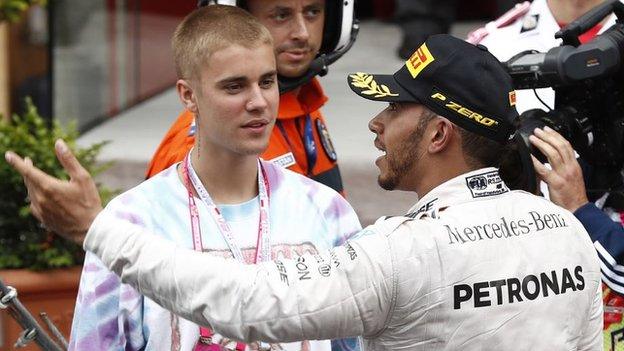
Lewis Hamilton claimed victory in wet conditions in Monaco and then promptly told singer Justin Bieber all about it
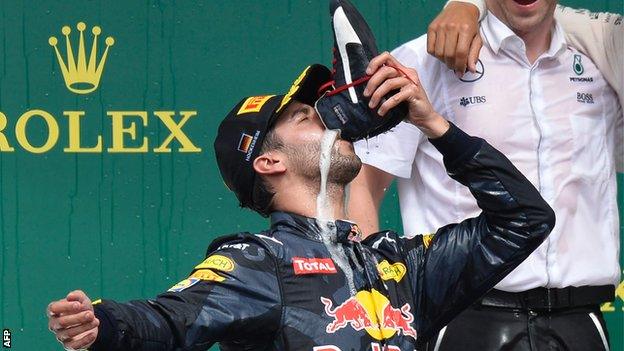
Drink after work? Daniel Ricciardo, unleashing his inner student, drank champagne from his boot at the German Grand Prix, the last race before the mid-season break